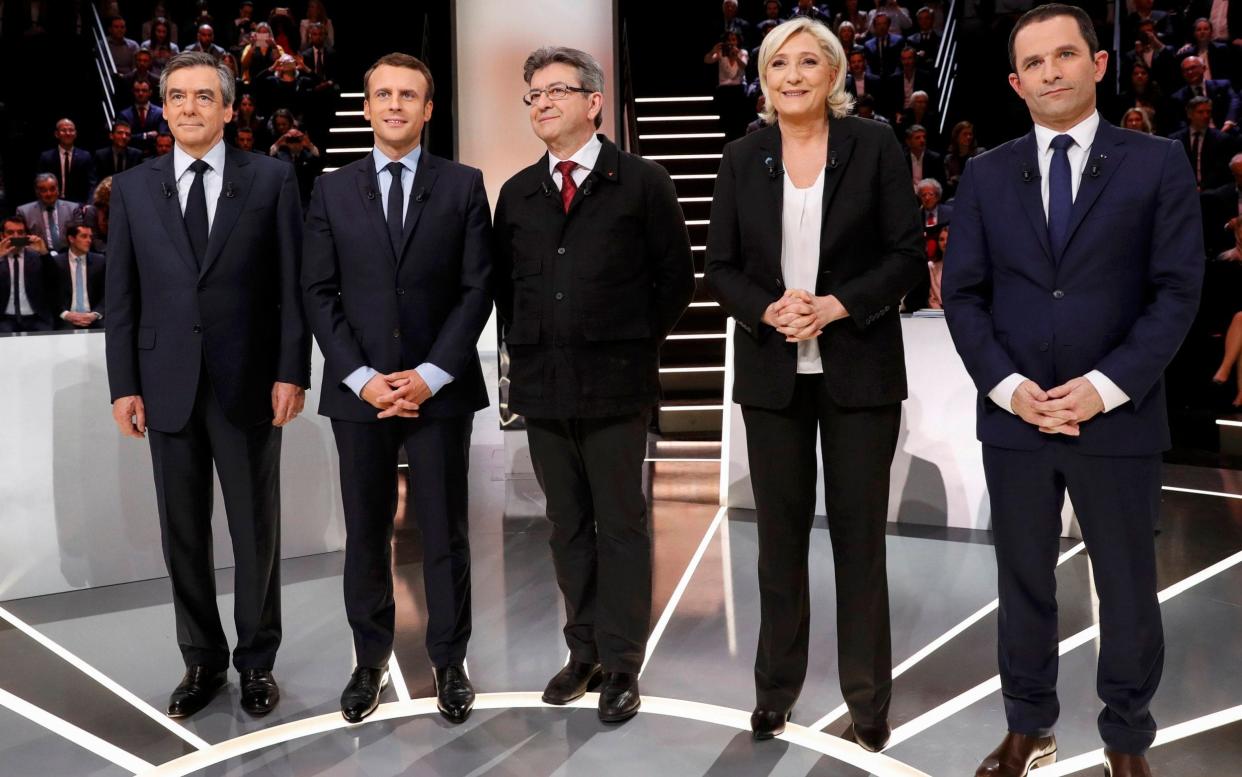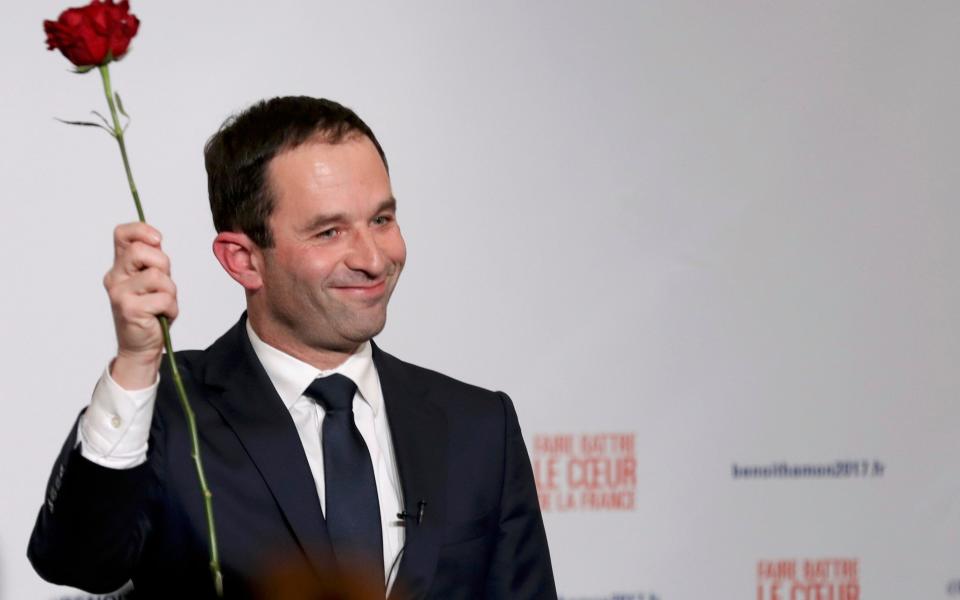When is the French Presidential Election 2017, how does it work and who are the candidates?

The French will go to the polls this weekend, and again on May 7 to pick their new president, and the world will be watching to see just how far the "populist wave" has travelled.
After the surprise of Britain's Brexit referendum and the election of Donald Trump as US president, just what kind of politician - and politics - France chooses will be of huge interest to many, not just those inside Europe.
Here's everything you need to know about the battle for the Élysée Palace.
Who are the candidates?
The top five candidates in 2017's French election are, in alphabetical order: Francois Fillon (Les Republicains), Benoit Hamon (Socialists), Marine Le Pen (Front National) and Emmanual Macron (Independent) and Jean-Luc Mélenchon (Unbowed France).
While there is no clear winner at this stage - political scandals, distrust towards the polls, and the recent shock Brexit result in Britain and Donald Trump's victory in the US mean that all sure bets off - there is a frontrunner.
When is the election?
The election will take place in just a few days and May of 2017.
Candidates are pitted against each other twice - the first round of the vote takes place on Sunday, April 23. Then, the two top candidates face each other in a second run-off, on Sunday, May 7.
French elections always take place on a Sunday.
Who's the favourite to win?
French elections are usually a two-horse with between the conservative Les Republicains (formerly the UMP) and the left-wing Socialist Party. But for this year's election, the goalposts have moved.
Francois Hollande's Socialist Party is in tatters after a disastrous term that has made him one of the least popular presidents in the country's history.
And with Les Republicain's Francois Fillon smarting from the scandal over claims he paid his wife thousands of euros to do a fictitious job, his victory is no longer a foregone conclusion.
Much ink has also been spilled over the possibility that Marine Le Pen could ride to the Elysée palace on a wave of populism.
Only one FN presidential candidate has made it to the second round - Jean-Marie Le Pen in 2002. His daughter Marine is virtually assured of doing so, current polls suggest, but her chances of winning the run-off remain highly unlikely.
Mr Macron has emerged in recent weeks as the clear favourite to win the second round runoff, but nothing is set in stone.
The Thatcherite: Francois Fillon
Mr Fillon began his campaign as one of the leading lights of the 2017 race. His love of Margaret Thatcher's reforms led to him pledging to slash France's bloated public sector, which infamously employs more than five million fonctionnaires - civil servants - who are perceived as doing little work.
But his campaign was plunged into chaos after a French newspaper accused him of paying his British wife, Penelope Fillon, just shy of a million euros to do a job that never existed.
He has been charged, as his wife, over the affair but has vowed to fight on, claiming he is the victim of a dirty tricks campaign orchestrated by François Hollande, the outgoing Socialist president.
The embattled conservative contender has seen his approval ratings plummet, and now faces being knocked out of the election.
However, backed by traditionalist Catholics, his core support base is standing firm, with one poll placing him on 19 per cent. He claims that silent masses of Right-wingers from among the 30 per cent of French who are currently considering abstaining will in fact turn up to vote, pushing him into the runoff. Definitely a long shot.
The far-right firebrand: Marine Le Pen
Her father, Jean-Marie, was a racist and a convicted holocaust denier who showed more interest in rabble-rousing than leading the Front National (FN) into power.
But Marine Le Pen, a former lawyer with a steely blue-eyed glare, is taking the far-right group in a decidedly different direction.
Once a neoliberal club for churlish business owners under Jean-Marie, who led the party for nearly four decades, Ms Le Pen has turned the FN into a movement for the populist era.
Her campaign of "de-démonisation" since clawing the leadership from her father in 2011 sought to soften the party's toxic image, and she is now being widely touted as a strong contender for the French presidency.
The gamble appears to have paid off - several polls have put Ms Le Pen in the lead, with speculation that the "Trump effect" could see millions of disillusioned voters pick her over Mr Fillon, the mainstream right-winger.
French election pundits, however, say it is unlikely she will win the second round of voting.
The centrist frontrunner: Emmanuel Macron
Emmanuel Macron, an ex-banker who has never held elected office, has gone from rank outsider to presidential frontrunner, and is polling to tie with Marine Le Pen in round one and then romp home in the runoff.
He was president François Hollande’s eminence grise at the Elysée advising him on economic reform before serving as economy minister from 2014 to last year.
But he angered his former mentor by resigning to create his new centrist party, called "En Marche" ("On the Move"). The presidential hopeful has cast himself as a maverick outsider in the wake of Donald Trump’s victory in America.
"I've seen the emptiness of our political system from the inside... I reject this system," he has said, calling for a “democratic revolution”.
The clean-cut pro-business ex-minister, who is married to a divorcee 20 year his senior, insists he is "neither of the Left or the Right" but “for France." The claim has seen a raft of reformist Socialists, including Manuel Valls, the ex-prime minister, backing him, but also centrist leader François Bayrou as well as lower-level Right-wingers.
Staunchly pro-European and pro-business, critics say he talks in empty slogans, with Ms Le Pen accusing him in the first presidential TV debate of having "taken seven minutes to say absolutely nothing".
As a relative newcomer to the rough and tumble of a French election campaign, his lack of experience will prove to be his main source of appeal, or his downfall, depending on who you ask.
The 'Corbyn clone': Benoit Hamon
Benoit Hamon, a leftist likened to Jeremy Corbyn, trounced ex-prime minister Manuel Valls in the French Socialist presidential primaries.
Mr Hamon, an ex-education minister, wants to reduce the working week from 35 to 32 hours, tax robots and provide a monthly universal basic income for all.

It was a shock result - Mr Valls, who was once touted as the "French Tony Blair", was once thought to be a certainty for the Socialist nomination.
Analysts said his victory helped boost the chances of maverick candidate Emmanuel Macron, as it left a "boulevard" in the centre-ground between Mr Hamon and Mr Fillon on the Right.
Despite receiving the backing of France's ecologists, polls indicate Mr Hamon is now trailing in fifth place, behind Leftist rival Jean-Luc Mélenchon.
He will likely be eliminated in the first round of the presidential election on April 23.
The anti-capitalist firebrand: Jean-Luc Mélenchon
The surprise fourth man of the presidential campaign, Communist-backed radical Jean-Luc Mélenchon is polling to beat Socialist candidate Benoît Hamon as the top choice of the Left.
The 63-year old veteran firebrand is calling for a nonviolent “citizens’ revolution” and for the constitution to be torn up and rewritten to end France's "monarchical" presidential system.

After trailing in fifth place, Mélenchon has seen support surge since stealing the show in the first televised presidential debate, averaging around 15 per cent in voter intentions.
The master of the acid one-liner, he won plaudits in the debate after riling the moderators for having the "modesty of a gazelle" for failing to grill Francois Fillon and Marine Le Pen over their legal woes.
Mélenchon is now stalking Mr Fillon, and claims he could reach the runoff against Ms Le Pen, his nemesis.
A former stalwart of the Socialist party, his movement, la France insoumise (Unbowed France), has a 350-point manifesto and a slogan, La force du peuple (the force of the people).
Mélenchon wants to soak - if not drown - the rich, proposing 100 per cent taxation for anyone earning more than €33,000 a month while raising the monthly minimum wage to €1,300 (£1,125).
He aims to renegotiate EU treaties to remove the yoke of “economic liberalism”; pledges to pump €100 billion into green projects and ditch nuclear power; restore the full retirement age to 60 and "move towards the 32-hour working week".
Accused - like Fillon and Le Pen - by detractors of being too pro-Putin, the Leftist wants to leave Nato and "renew dialogue" with Russia.
He has toned down his rhetoric to broaden his appeal and says he has become "less of a hothead", but he will need to capture a far larger chunk of the working-class electorate to rise any higher.

 Yahoo News
Yahoo News 